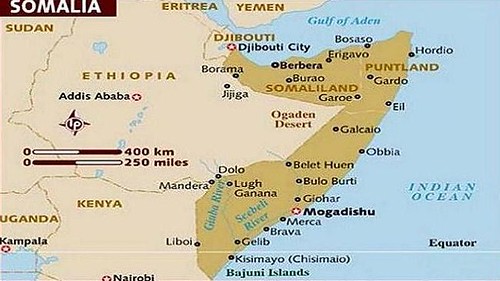
Map of politically fragmented Somalia. Protesters in Somaliland were attacked by police after demonstrating for the further break up of the northern enclave in the Horn of Africa state., a photo by Pan-African News Wire File Photos on Flickr.
Somalia's Shocking Response to a Rape Report
02/22/2013 1:04 pm
Huffington Post
A 27-year-old woman in Mogadishu who reported that government security forces raped her was convicted on criminal charges this month. The court also convicted a journalist who interviewed her. He is in prison; her term will start when she finishes breastfeeding her baby. Their appeal hearing was postponed this week so the journalist will spend at least one more week in prison.
The government accused the woman of fabricating her story and said that both were trying to insult the government and profit from the story. But it's hard not to conclude that the government was more concerned about protecting itself than about protecting women from rape.
I run a shelter for survivors of sexual and gender based violence in Mogadishu. We have been fighting long and hard to encourage women to come forward and feel confident in saying, "This has happened to me."
But since this shocking case broke, survivors who come to us have been asking us: "Will I face jail if I report my case?"
And who can blame them? We try to convince them to come forward, but we fear we have lost ground now. Every woman in Mogadishu has heard of this case. Now they will think twice about reporting sexual abuse at the hands of pro-government forces.
The arrival of a new government in September last year gave us hope. After two decades of civil war, security is slowly returning to my city. Thanks to improved security, greater access and our work here, more organizations focused on sexual violence have been able to open their doors. There is more reporting and a bit more access to services for victims. But we still have a long way to go.
At this time of fragile hopes, this case is sending the worst possible message to the women in my community.
Sexual violence is a problem everywhere in Somalia, including areas controlled by the new government. Women who have had to flee their home areas because of the fighting or famine, including the woman in this case, are particularly vulnerable.
This case has sent us all a chilling message that women who dare to report abuse risk this young woman's fate: abusive police interrogations without a lawyer, police threats and intimidation to recant the allegation, public shaming before our country's media, and then an unfair trial capped by a prison term.
In November, our new president, Hassan Sheikh Mohamud, publicly promised to hold government forces accountable for rape. Under the former transitional government, we battled endless denials that rape by its soldiers was even happening. Finally we felt we had a government counterpart we could talk to and work with; and finally, that we would no longer battle this problem alone. This collaboration is key for our fight. As much we try, we are not the ones who can deliver justice to the many victims we meet each week in our shelter. Only our government can do that.
If our authorities want women to come forward and report, as they keep saying, these women need to feel that they will be taken seriously, that they can receive services without fear, and that the men who rape them will face justice. No woman should worry she will face prison for asserting her rights.
As someone who provides services to rape victims, I am troubled by the case's implications for us. This case may only make women more fearful that if they seek help from us, we may not be able to maintain their confidentiality.
Victims should feel confident to come forward, service providers should feel confident they can provide services without any repercussions to themselves or the people they serve, and others should feel confident that they can investigate and report on this issue free from reprisals. That must be the new Somalia.
I feel proud of what my shelter has achieved so far in Mogadishu: there are now more organizations working on these issues and we have more women willing to come forward.
This case is serious step back for us. But I remain hopeful. Last week I participated in Mogadishu in a "One Billion Rising" event, as part of a global campaign to end violence against women. Not so long ago we could not have organized such an event, nor been part of a global campaign, much less received support from the government.
I believe our leaders will do the right thing: turn back the clock on this shocking case, overturn the convictions, release the journalist from prison, and focus their energy and resources on ensuring that survivors of sexual violence get the justice and services they deserve.
Fartuun Abdisalaan Adan is the Director of the Elman Peace and Human Rights Center, Mogadishu, Somalia. She is also a founder of Sister Somalia, the first rape crisis center in Mogadishu.
No comments:
Post a Comment